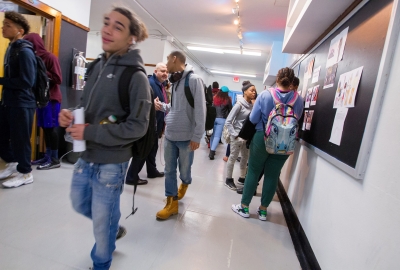
The following centers and labs produce and/or fund research and events on issues related to education policy across NYU Steinhardt.
Research Centers

The Consortium for Research and Evaluation of Advanced Technologies in Education (CREATE)
The Consortium for Research and Evaluation of Advanced Technologies in Education (CREATE) is a consortium of researchers committed to conducting research, providing education, and fostering community interaction to design evidence-based digital media that address the needs of all learners.
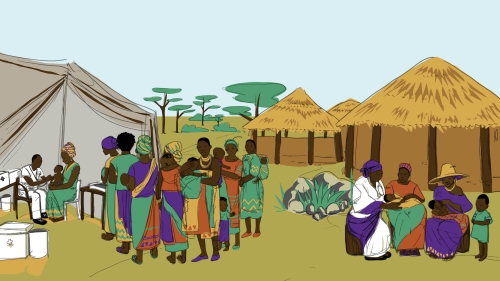
Global TIES for Children
Director: Florencia Lopez Boo
Our international research center harnesses New York University’s global scholarship, resources, and networks to ensure programs and policies to improve child outcomes are based on culturally grounded evidence - and ultimately, more effective. We work in partnership models to do this, combining cutting-edge and cross-disciplinary research methodologies to support initiatives that enable children, their caregivers, teachers, and communities to thrive.
Without scientific understanding of how children develop, practitioners and policy makers lack the tools to achieve breakthrough impacts. This is where Global TIES for Children comes in – we are one of the largest university-based research centers devoted to improving holistic learning and development for children in the most volatile areas of the world. Achieving scientific insight through partnership and network models, we address the 21st century challenges that policymakers, NGOs, and researchers face in ensuring that children everywhere have the supports they need to grow up to be healthy and productive citizens of the world. Our research demonstrates how quality improvements in education, health, social protection, poverty reduction and other areas can improve children’s outcomes.

Metropolitan Center for Research on Equity and the Transformation of Schools
Director: Dr. Fabienne Doucet
NYU Metro Center focuses on driving equity and access in school settings--especially when confronting issues of difference across race, gender, gender identity, national origin, socioeconomic status, and other identities historically marginalized in educational spaces. Our comprehensive programs and projects serve a wide range of constituencies and our persistence of vision, mission, and values have forged NYU Metro Center into a nationally recognized leader in educational equity.
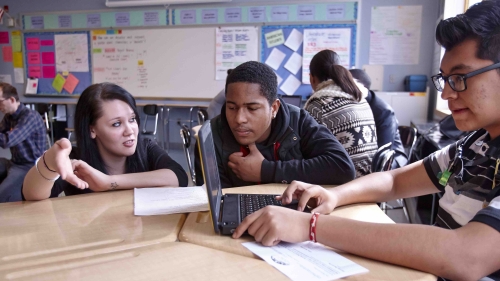
The Research Alliance for New York City Schools
Director: Dr. Cheri Fancsali
In 2008, a diverse group of civic leaders came together to form the Research Alliance for New York City Schools. The group coalesced around the need for better evidence about problems facing the City’s schools—and about the effectiveness of various reforms aimed at addressing these problems. They set out to develop an organization that could collaborate with policymakers and educators to conduct high-quality and useful research, while also offering essential independent analysis of outcomes, trends and reform strategies.
Today, the Research Alliance is an important and growing part of NYC’s civic infrastructure. We conduct rigorous studies on topics that matter to the City’s public schools. We strive to advance equity and excellence in education by providing credible, nonpartisan evidence about policies and practices that promote student success.
Housed at New York University, within the Steinhardt School of Culture, Education, and Human Development, the Research Alliance:
- Conducts rigorous, applied research in collaboration with policymakers, educators, and other stakeholders;
- Maintains a unique archive of longitudinal data on NYC schools and communities, to support ongoing research; and
- Communicates the results of our work to multiple audiences here in NYC and around the nation.
Since our launch, the Research Alliance has generated valuable information on topics ranging from high school choice and preparation for college and careers to accountability and school improvement. To learn more about this work, please browse through our projects and publications.

The Institute of Human Development and Social Change (IHDSC)
Director: Dr. Erin Godfrey
The Institute of Human Development and Social Change's (IHDSC) mission is to inspire, support, and amplify innovative and equity-driven scholarly research through excellence in individualized grant administration and research development, community engagement, and the promotion of evidence-based research products. By prioritizing principles of social equity, collaboration, and interdisciplinarity, we strive to stimulate social impact locally and globally.
IHDSC represents a dynamic collaboration among four NYU schools: Steinhardt School of Culture, Education, and Human Development; Faculty of Arts and Science; Robert F. Wagner Graduate School of Public Service; and School of Professional Studies.
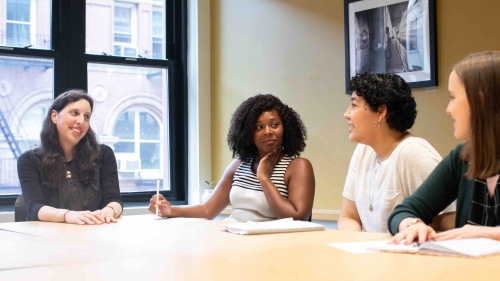
Steinhardt Institute for Higher Education Policy
Directors: Dr. Ann Marcus and Dr. Teboho Moja
The Steinhardt Institute for Higher Education Policy seeks to define and assess the critical challenges facing colleges and universities in the present era. The Institute incorporates an international perspective in its work and supports research and dialogue that enhance our understanding of higher education as an institution that both reflects and influences social, cultural, racial and economic difference.
The Institute’s programs encourage collaborative relationships among scholars, institutional leaders and policy makers in an effort to raise public awareness about the essential roles of colleges and universities in the organization of modern societies. The Steinhardt Institute is committed to the ideal of the university as an institution that advances the public interest.
An integral part of New York University's Steinhardt School of Culture, Education, and Human Development, the Institute engages faculty from many fields and disciplines. Its work in the public sphere is advanced by its close proximity to New York City's influential policy, media and philanthropic organizations.
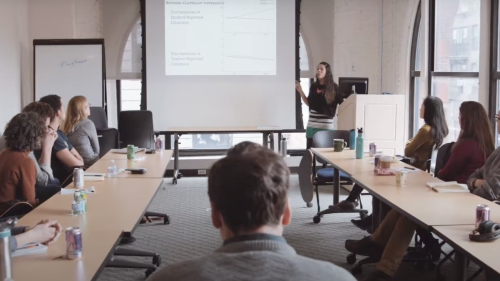
Institute of Education Sciences-funded Predoctoral Interdisciplinary Research Training (IES-PIRT)
Directors: Dr. James Kemple and Dr. Elise Cappella
Since 2008, NYU’s Institute of Education Sciences-funded Predoctoral Interdisciplinary Research Training (IES-PIRT) program has trained the University’s highest caliber doctoral students in the Education Sciences with a substantive focus on “learning in context.” The program provides strong attention to methodological rigor through training in causal inference and a robust interdisciplinary perspective.
Research Labs

The CONNECT Lab
The CONNECT lab at NYU conducts research to understand and strengthen contexts for learning and mental health in low-income education settings. We study natural opportunities for academic, social, and emotional learning via productive relationships and quality interactions.
Using social network approaches, we investigate and enhance connections among children, between children and non-familial adults (educators, practitioners), and among adults who work with youth. We collaborate with school and community partners to activate internal resources to support children with and without behavioral difficulties.
The long-term goal is to increase the likelihood that more young people will have the connections and opportunities they need to succeed in school and life.
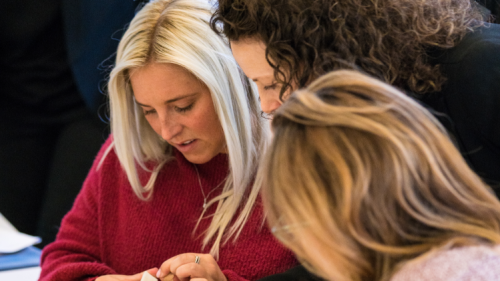
NYU SAIL Research Lab
PI: Dr. Okhee Lee and Dr. Lorena Llosa
The purpose of the SAIL-On project is threefold. First, we will develop a teacher professional development (PD) program to support classroom implementation of the SAIL curriculum. Second, we will develop and validate the instruments needed to rigorously study the SAIL intervention and its impacts on teachers and students, including English Learners (ELs). Third, we will conduct a quasi-experimental field trial in New York City Public Schools to continue gathering evidence of the SAIL intervention’s impacts on teachers’ instructional practices and students’ learning outcomes.

SMART Beginnings
PI: Dr. Pamela Morris and Dr. Alan Mendelsohn
The SMART Beginnings project tests a comprehensive approach to the promotion of school readiness in low-income families, beginning shortly after the birth of the child, through enhancement of positive parenting practices (and when present, reduction of psychosocial stressors) within the pediatric primary care platform. We do so by integrating two evidence-based interventions: 1) a universal primary prevention strategy (Video Interaction Project [VIP]); and 2) a targeted secondary/tertiary prevention strategy (Family Check-up [FCU]) for families identified as having additional risks. VIP provides parents with a developmental specialist who videotapes the parent and child and coaches the parent on effective parenting practices at each pediatric primary care visit. FCU is a home-based, family-centered intervention that utilizes an initial ecologically focused assessment to promote motivation for parents to change child-rearing behaviors, with individualized follow-up sessions on parenting and factors that compromise parenting quality.
Two pediatric primary care settings serving low-income communities in New York City, NY and Pittsburgh, PA are utilized to test the integrated intervention in hospital-based clinics, providing information about translation across venues where one of the two interventions has been previously used alone.
The VIP/FCU model is tested in a randomized control trial, utilizing parent surveys, observational data on parent-child interactions, and direct assessments of children’s development, at key points during intervention follow-up. Analyses will address questions of program impact for the integrated program across all families and by key subgroups.
The largest single contribution made by this study is to test whether an integrated primary and secondary/tertiary prevention strategy implemented in pediatric primary care can produce impacts on early school readiness outcomes, including social-emotional, pre-academic, and self-regulation. As such, this study has the potential to provide the scientific and practice communities with information about an innovative and strategic approach to promoting school readiness skills among low-income children.
Drs. Pamela Morris-Perez (NYU), Alan Mendelsohn (NYU School of Medicine), and Daniel Shaw (University of Pittsburgh) have received support and funding for this project from the National Institutes of Health.
